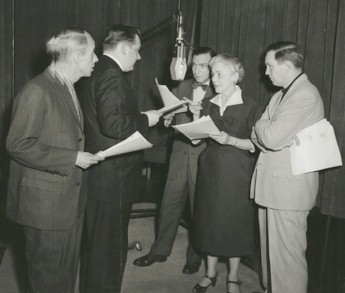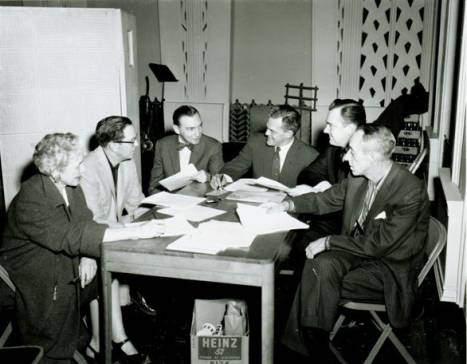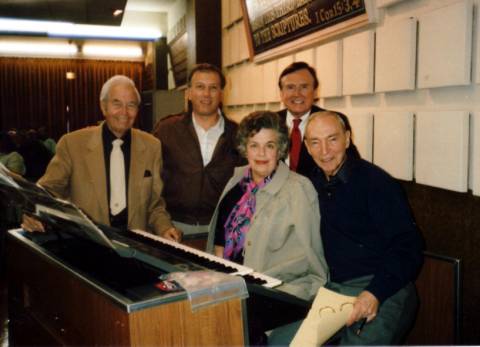A mid-1950's rehearsal prior to broadcast. (L to R) Alma Platt, Harry Elders, Russ Reed, Jack Odell, Jack Bivans, Norm Gottschalk
"UNSHACKLED!"
Actors Norm Gottschalk, Jack Bivans, Russ Reed, Alma Platt, and Harry Elders rehearse a 1950's production

I still work on one radio program. I don't work on it too often anymore. Its called "UNSHACKLED!" - sponsored by the Pacific Garden Mission, which is a rescue mission at 646 South State Street in Chicago.
It's been there over a hundred years and this mission helps people, men and women, who've had terrible things happen in their lives, women who are battered and who have little children, and they take them in and they feed them, and they clothe them and they bathe and nurture them and then try to find them work. They're dealing, not exclusively, but primarily, with bums; people that sleep under signboards, who have no homes - alcoholics in many, many cases. Or, in other cases, people who just are down on their luck for whatever reason. They've lost their jobs, their homes, and their willingness to fight to stay alive. And this program that they sponsor is a dramatic radio program. It's the longest running dramatic radio program in existence in the world. From time to time, you hear a dramatic radio program, say on the BBC or something, but I mean every week for forty-five years now. And it deals with the true-life stories of skid row characters, alcoholics, bums, narcotics addicts, prostitutes, thieves, murderers, wife beaters; you name it - people that have gone right down into the gutter and who have turned their life over to Christ and found themselves a new way out through the help of this mission. And most of the time, not all of the time, when we do this program, one person plays the leading part and tells his or her story about his or her life. When he was twelve, this happened. When he was sixteen, that happened. When he was twenty-four, this happened. When he was thirty-eight, that happened. And so on. I've played some parts from the age of seventeen years old to sixty-seven years old. Just play them in various voice ranges that you can do as a trick. And frequently the person whose story you're doing is sitting right there in the audience.


And boy, did that used to get me scared! I used to think, "Oh, isn't this something? Here I'm telling their story and they've got tears running down their cheeks because they are listening to their story. I felt so strange! I don't feel that strange anymore because... after forty-five years! But, it's quite a program and it's heard on over a thousand stations throughout the world, on tape. And we tape it at the mission. I used to be on it almost every week, and then later every other week, and now maybe every six or eight weeks. It's because the guy that's running it now has been told, "Don't hire these old timer guys. Hire the new younger ones that can learn and grow with the story." But, it's been lot of fun and a great inspiration to me personally, as I'm sure to those who listened. When I started as an actor, we had a venue - a place to learn our craft. There were a lot of different programs on the air and you got a chance to try different things and to learn how to be better. Each time you did it, you were better. Now, for the young persons starting out, that's the only program that they can learn about radio acting.
Left to right: Harry Elders , Nick Aloisio, Lucille Becker, Jack Bivans, Russ Reed
There's a big difference between acting on radio and stage. It's an incredible difference. When you're acting on the stage, you're projecting your voice so that the person in the last balcony can hear you. Like Tony Bennett, he knows how to project the sound of his lovely singing voice. That's a stage actor. A movie actor learns that you don't move your eyebrows up and down, because if you do, and you go to the movies to see them, the eyebrows are eight feet long on the screen and they look like a couple of diving boards going up and down. So most good movie actors don't move anything above the bridge of their nose. They move their mouth and their eyes; they work with their eyes. And a radio actor can do anything they want, because nobody can see them. Most radio actors are lousy movie actors and just so-so stage actors, because they overact. They do too much. They know what to do with their voice to sound underplayed, overplayed, just right. But in order to make that sound with their voice, they move their face a lot, and their arms, their feet, and they're doing all kinds of crazy things to get just the right sound. So if you come down to the mission and watch, and two hundred people can come there every week watch the show being produced, if you're to come down to the Pacific Garden Mission and sit in the audience and watch these people, these radio actors, if you were to close your eyes, you'd hear a terrific performance. If you were to watch them, you'd say, "What are they doing? They're moving around. They look crazy!" So you put a movie actor, not all of them, I'm using generalities now, you put a movie actor on a stage, and you can't hear him past the fourth row. Or they're not doing enough with their eyes and arms, so that they looks like a stick. It's a different technique.
